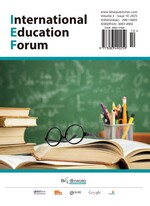Abstract
Deepening regional cooperation between China and ASEAN urgently requires innovative paradigms for intercultural communication competence. This study focuses on the implications of the Confucian concept of “harmony without uniformity” for constructing a China-ASEAN-specific theoretical framework of intercultural communication. By reinterpreting classical texts and reconstructing the philosophical meaning of this concept, the study reveals its core value: the dynamic unity of embracing differences while fostering consensus. The current dominant Western paradigms guiding China-ASEAN intercultural communication practices exhibit structural limitations in both respecting cultural heterogeneity and seeking common values. The concept of “harmony without uniformity” thus offers a valuable indigenous theoretical resource. It suggests a shift from mere transplantation of foreign models to the development of a more inclusive and effective theoretical framework centered on cultural symbiosis. This new framework advocates for constructive dialogue to identify shared interests and cooperative opportunities, while fully acknowledging and respecting cultural diversity, thereby achieving harmonious coexistence and mutual development. Based on these insights, the study proposes practical pathways for theoretical transformation, including reshaping intercultural education concepts, enhancing adaptability in multicultural contexts, and strengthening policy coordination. The goal is to provide theoretical support and practical guidance for the steady and long-term development of China-ASEAN relations.
References
Zhang X, 2024, Harmony without Uniformity: The Ethical Realization of Confucian Common-Value Thought. Guizhou Social Sciences, 2024(6): 30–38.
Guo Y, Liu X, 2024, The Idea of a Cultural Community of “Harmony without Uniformity”: A New Perspective in U.S. Ethnic Literature Studies. Journal of Henan University (Social Science Edition), 64(6): 75–80 + 154.
Liu S, 2023, The Social View of Harmony without Uniformity: The Ideological Origin of Forging Value Consensus. Shandong Social Sciences, 2023(6): 20–26.
Zhang Y, 2023, Spontaneous Integration: On the Interrelation of Individuated Things in Guo Xiang’s Philosophy. History of Chinese Philosophy, 2023(4): 50–57.
Lhamo J, 2025, From Anthropological Ontology to a Temporal Wheel Universe Structure Perspective. Tibet Studies, 2025(1): 75–87 + 157–158.
Zhao L, Yin J, 2018, From Transcendental Argumentation to Naturalistic Argumentation: On Social Ontology in the View of Naturalism. Hunan Social Sciences, 2018(6): 39–44.
Zhuang H, 2024, “One Country, Two Systems” from the Perspective of a Culture of Harmonious Integration. Southern Forum, 2024(12): 14–16 + 20.
Liu L, 2016, Liang Shuming’s Views on Chinese and Western Cultures and his Ideas on University Education. Heilongjiang Higher Education Research, 2016(10): 24–26.
Fang Q, Zhao M, 2025, Contextual Failure of AI Cultural Perception: Technical Dilemmas and Paradigm Reconstruction in Intercultural Communication. Science & Technology Communication, 17(8): 150–154.
Guo C, 2021, Modern Transformation of the Traditional Thought of “Harmony without Uniformity”: Innovative Development and Contemporary Value. Dongyue Forum, 42(4): 75–81 + 191.
Li Y, Liu J, 2021, Paths to Enhancing Intercultural Communication Competence Based on Bourdieu’s Field Theory. Learning & Practice, 2021(3): 125–131.
Zhang X, 2024, Harmony without Uniformity: The Ethical Realization of Confucian Common-value Thought. Guizhou Social Sciences, 2024(6): 30–38.
Liu H, 2024, The World Significance of “Harmony without Uniformity” in The Analects. Journal of Shanxi University (Philosophy & Social Sciences Edition), 47(2): 67–73.
